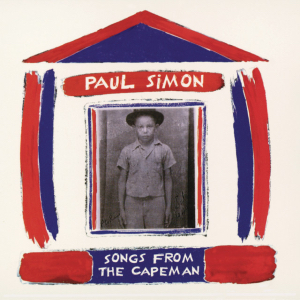It turned out he’d been very busy for most of the ‘90s working on a Broadway musical, which took both a lot of work and a lot of money. He soon learned the hard way that neither of those factors would guarantee success. The Capeman was based on the life of a convicted murderer who dominated New York City headlines in the late ‘50s, partially because of his youth and partially because of his Puerto Rican heritage. Simon’s approach to creating this grand work was unorthodox, and he didn’t make too many friends in the process. When the show debuted, it was lambasted, but the writing was already on the wall when people heard the album designed to preview and promote it.
Songs From The Capeman is credited to Paul Simon alone, but many of the vocals are handled by the actors and actresses in the play, to the point where one forgets who wrote everything. Marc Anthony and Ruben Blades appear here and there, yet he himself sings “Born In Puerto Rico”, which is hard to believe even as a character because of his by-now familiar voice. (José Feliciano sings the version added as a bonus track the following century, and it’s better.)
The album demands attention, since the lyrics (or libretto) is very important to the story at hand. It would help if the story were linear, but it’s not. It’s easy to slip into the background, and then some spurt of profanity or stereotypical patois will leap from the speakers, and we worry about its effect on impressionable children. That happens a lot in “Adios Hermanos”; loading up your opening track with f-bombs isn’t likely to appeal to a more conservative fan base. Dialogue from archival interviews is intended to add gravitas, but merely muddies the process.
Musically it’s not bad; we’re in no position to judge the authenticity of the Latin heritage and style, but this is mostly balanced throughout by a wonderful smattering of doo-wop. “Quality” balances two doo-wop styles, the solo croon and the girl-group chorus, quite well, and better than the dual personality of “Bernadette”. “Virgil”, sung from the point of view of a prison guard, sounds like a hokey Western gunfight. “Killer Wants To Go To College” is a decent tune with too much plot, even split into two parts. “Trailways Bus” will only have one yearning to hitchhike from Saginaw with a pack of cigarettes and Mrs. Wagner’s pies. The finest moment could be “Can I Forgive Him”, set up as a conversation between the Capeman’s mother and those of the murder victims, and sung by himself to the accompaniment of his acoustic guitar.
The Capeman was an interesting concept, but ultimately the Songs From The Capeman are bound to the show. While moments of clarity shine through, it’s a vanity project, and not really worth the trouble. The expanded version from this century would have been an excellent opportunity to illuminate any part of the story, but merely adds the Feliciano track mentioned above, along with another schizophrenic doo-wop track in “Shoplifting Clothes” and an unfinished demo of “Can I Forgive Him”. Clearly, he’s moved on.
Paul Simon Songs From The Capeman (1997)—2
2004 CD reissue: same as 1997, plus 3 extra tracks

No comments:
Post a Comment